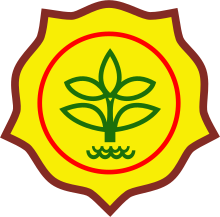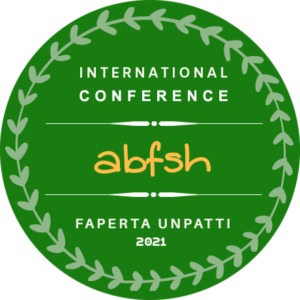




Following our last international Conference on Agriculture, Biodiversity, Food Security, and Health during the COVID-19 Pandemic in December 2020 (https://abfsh.faperta.unpatti.ac.id/about/), we would like to host a similar conference this year on Strengthening Food Security and Sustainable Energy for Small Island Communities. As the COVID-19 Pandemic continues to threaten the global population, it is critical that food security and energy sustainability are prioritized, particularly for people living on small islands that face unique social, economic, and environmental vulnerabilities
As we all know, the food supply has become a critical focus during COVID-19 pandemic. Food products with better nutrition and a well-balanced diet are necessary to support a robust immune system. In the province of Maluku, small island communities depend mainly on agriculture and fisheries as their main livelihoods. The province of Maluku occupies a total area of 712.479,65 km2 which comprises 92.4% of the sea and 7.6% of the land. This 7.6% of the land is derived from the accumulation value of 1.340 islands in the Province of Maluku. These facts emphasize that Maluku is an archipelago province. Furthermore, out of 1.340 islands, there are only four big islands with a total area of more than 2,000 km2. Therefore. the Province of Maluku is categorized as a small island province.
A small island is defined by the Department of Marine and Fisheries’ Ministerial Decree No. 41, 2000, as one that is equal to or less than 10,000 km2 in area, and has a population of less than 200,000. On the other hand, UNESCO defined a small island as one with an area of fewer than 2,000 km2. and distinguished very small islands from small islands based on their scarcity of freshwater resources. Very small islands are those with an area of less than 100 km2 or a width of less than 3 km.
Many small islands developing communities face similar challenges to sustainable development, including small populations, limited resources, susceptibility to natural disasters, vulnerability to external shocks and excessive dependence on international/domestic trade for food products. Their growth and development are frequently hampered by high transportation and communication costs, disproportionately expensive public administration and infrastructure due to their small size, and little or no opportunity to create economies of scale. As a result of these obstacles, communities are vulnerable when it comes to food and nutrition security.
Researches show that many challenges in the agricultural sector today are closely linked to local society. The local population is of importance to the sector in different ways such as they are responsible for the largest part of the demand for locally produced food, they are the potential workforce, and they also hold a certain amount of political decision power. The communities on average valued local food highly acknowledged the importance of local agriculture in terms of ensuring food security and were in favor of strong governmental support for the sector. It has therefore become evident that a strong institutional framework, higher funding as well as a consolidated effort from the different actors involved, are needed to strengthen the agricultural sector of the small island communities.
Three-quarters of the Earth’s surface is covered by oceans and seas, which are an engine for global economic growth and a key source of food security. Development programs on the development of the small island in Indonesia have been reoriented to the development of the marine sector. Small islands have great potential for the development of resource-based marine industries, such as fisheries, manufacturing, and tourism. Small islands are potential resources in having coral reefs, seagrass, mangroves, fishery resources, as biological resources, as well as non-biological resources such as mining and marine energy.
The smaller the size of the island, the smaller the size of habitats as well as the number of the ecological gradients and thus the fewer opportunities for agricultural development as a source of food and energy. Small and very small islands face a number of specific constraints, including a scarcity of arable land for agriculture, fragile ecosystems, small catchment areas and a limited fresh water supply, as well as, vulnerability to global environmental and economic changes. With these constraints, the natural resources of small and very small islands should be managed sustainably. According to the United Nations, Sustainable development is defined as “development that meets the needs of the present without compromising the ability of future generations to meet their needs”. Therefore, it is becoming increasingly essential to meet the need for food and to maintain food security while preserving nature in sustainable ways.
Renewable energy is the answer to the energy shortage. An energy resource is classified as renewable energy if it is always available without degeneration and depletion. Renewable energy uses sources of energy that are renewed continuously depending on nature such as the sun, wind, and plants. Renewable energy systems could solve energy and water supply issues, increase living standards, create job opportunities, and solve environmental issues. Renewable energy is generally determined as the utilization of energies like biomass, solar, wind, and hydropower for generating electricity and has the capacity for job creation in local communities. Renewable energy sources can replace the traditional fossil fuels in some areas such as generating electricity, heating water, cooking energy, etc. Therefore, it is the main concern to explore the alternative to fossil fuels for small island communities in pursuit of energy efficiency on a sustainable basis.
There are three main aspects that influence the sustainability of food and energy security: availability, distribution, and consumption. How could these three aspects be implemented in order to sustain the prosperity of the small island communities? Therefore, it is essential to conduct this international conference on “STRENGTHENING FOOD SECURITY AND SUSTAINABLE ENERGY OF THE SMALL ISLAND COMMUNITIES”
It is expected that the conference will result in finding a strategic policy concerning the sustainability of food and energy security for the small island communities.

